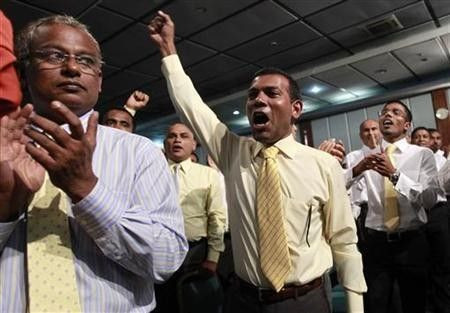Maldives Ex-president Demands Fresh Election; Vows Mass Street Protest

The former president of the Maldives, Mohamed Nasheed, on Friday demanded new elections and vowed mass street protests if the new government did not relent, raising the prospect of a protracted crisis on the Indian Ocean islands famed as a beach paradise.
Former Maldivian president Mohamed Nasheed cheers as he arrives at a Maldivian Democratic party meeting in Male February 9, 2012.
Nasheed was free despite an arrest warrant against him as diplomats including a U.N. envoy worked to forestall renewed violence after his removal this week, which he said happened at gunpoint in circumstances he described as a coup.
He demanded his successor, President Mohamed Waheed Hussain Manik, step down and hand power to the speaker of the parliament for two months, until a new presidential poll can be called. The next election was due in October 2013.
Fresh elections are our bottom line and we are not relying on the international community for that, we are relying on the people of the Maldives, Nasheed told reporters. The medicine here is on the streets, in strength.
Rain and cooler weather appeared to ease tension a day after the new government issued a warrant against Nasheed, who quickly returned to his roots as a street activist and dared police to arrest him.
But Nasheed said police and military were ransacking Addu atoll, a bastion of his supporters, and were dragging people out of their homes and beating those who belonged to his party, with rival party members helping to identify them.
We are losing a country as we speak, he said, describing the attack as retaliation. Police said his supporters razed at least 20 government buildings on Wednesday night.
Earlier, Nasheed, speaking to Reuters in front of his family home in central Male, capital of the 1,200-island archipelago of 330,000 Sunni Muslims, said there had been no clarification on the status of his arrest warrant.
CALL FOR CALM
His increasingly defiant tone came as a host of diplomats flew into the archipelago to calm tensions.
He spoke right after meeting an Indian foreign ministry delegation and before meeting U.N. Assistant Secretary-General for Political Affairs Oscar Fernandez-Taranco.
Fernandez-Taranco, who arrived late on Thursday, joined Western governments, India and the Commonwealth in urging calm and dialogue. The U.N. envoy also met new president Waheed, whom Nasheed wants to step down.
We told the president that at this time, it is very important to ensure the police and military operate on an entirely constitutional level to cool the temperatures, Akbar Khan, the Commonwealth delegation head, told Reuters.
The fragility of the democratic transition here was clearly demonstrated by recent events.
The Maldives, for almost nine centuries a sultanate before it became a British protectorate, held its first fully democratic elections in 2008. Nasheed defeated Maumoon Abdul Gayoom, who at 30 years in power was then Asia's longest-serving leader and accused of running the country as a dictator.
Security forces, a group of whom Nasheed accused of conspiring with political rivals to usurp him under the guise of a constitutional handover to his vice president, took no chances during Friday prayers.
About 50 troops and police wearing helmets and riot gear stood guard in Republic Square, site of the Grand Mosque and two days of violence that first saw Nasheed unseated and then roughed up along with supporters as they protested his ouster.
An Indian government official said Indian ships were close by and monitoring the situation and could help with the evacuation of tourists if the situation worsened.
India saw the events in the Maldives as its internal affair, the official said, adding that India hoped elections would be held at the earliest date to the satisfaction of all political parties.
© Copyright Thomson Reuters 2024. All rights reserved.





















